Lamb News
Tesco is to stop selling lamb products in mixed origin packs following a meeting with the National Farmers’ Union (NFU).

From February of next year, the retailer will only supply packs of lamb that clearly state which country the product is from. Tesco had previously come under fire from farmers over the number of product facings they dedicated to produce from non-British countries.
The meeting involved the NFU, NFU Scotland, NFU Cymru, and Ulster Farmers’ Union, as well as the retailer and its processor representative, with the aim of highlighting the role Tesco has to play in supporting the British lamb sector.
A joint statement from the four farming unions said: “The meeting involved robust, but useful discussions where all parties agreed that there was a real benefit in continuing conversations to develop greater transparency in the lamb supply chain.
“At this meeting Tesco has confirmed that at the end of February 2016, it will not be selling lamb products in mixed origin packs. The unions welcome this move as it will allow customers to make an informed decision in the origin of the product that they are buying.”
A spokesperson for Tesco said: “We have a long history in supporting UK agriculture and continue to have an open conversation with the NFU and processors on the crucial roles we all have in supporting the lamb industry. We updated them on our plans, which included the single source labelling of products like mince.”
Lamb farmers and producers are being urged to ensure their sheep are vaccinated as autumn arrives.
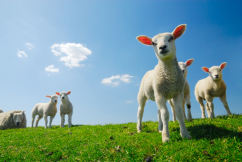
The appeal comes after the results of AHDB Beef & Lamb’s Fallen Stock initiative revealed that certain illnesses in lambs were more prominent during the autumn months.
Research from the project, which ran from April 2014 to June 2015, showed that pulpy kidney, a common clostridia disease, was at its highest levels during October 2014 for lambs receiving hard feed.
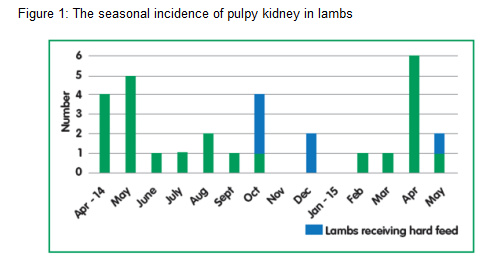
It is believed this can be attributed to a change in their natural diet as the seasons change. Where lambs had been receiving hard feed, most had not received a booster prior to the change in diet.
Furthermore, immunity that they might have obtained from drinking colostrum at birth might have worn off by this time, implying that a vaccination booster could aid them.
“If producers are keeping store lambs during this period, they should be vaccinated ahead of any anticipated adverse weather or other stressors such as moving,” claimed Dr Liz Genever, senior sheep and beef scientist.
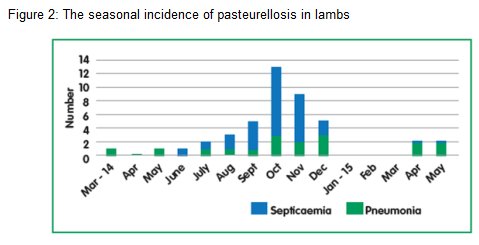 “Lambs that are vaccinated when they are young, from one-month-old, may lose their immunity by the autumn if not given a booster around September.”
“Lambs that are vaccinated when they are young, from one-month-old, may lose their immunity by the autumn if not given a booster around September.”
In addition, the research also proved that cases of pasteurella deaths reached new heights in lambs during October.
“There is a clear need for this, as lambs had been vaccinated according to the data sheet in only 12% of the outbreaks monitored,” added Genever.
“These diseases can be prevented by the administration of appropriate vaccines and should be done as soon as possible.”
Supermarkets are “taking advantage of lamb farmers”, according to #NoLambWeek campaigners
Speaking to Meat Trades Journal, one of the farmers behind the #NoLambWeek campaign said it needed to happen to raise awareness of the issue.
Remaining anonymous to protect his identity and that of his farm, he explained how his business stands to lose £25,000 this year alone and that lamb prices are not going to increase anytime soon while the supermarkets keep retail prices the same.
“If they brought the price of lamb down, it would increase demand and we would all win. Instead though, they’re buying in lamb from New Zealand and flooding the market. We understand there are other factors affecting the market such as currency fluctuations but British supermarkets should be supporting British farmers and British produce but instead they’re just abusing them.”
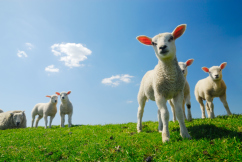
According to farmers, their share of lamb sold on supermarket shelves has dropped 10% from 60% to 50% in the last year. This led to a group of lamb farmers refusing to sell their prime lambs between the 1-7 August while some protested at supermarkets.
#NoLambWeek campaigners believed it brought the discussion into the open. “It was more a statement than a protest but it got the general public to realise how bad the situation is. Some farmers are struggling so much that they couldn’t actually afford not to sell their lambs during the week.
“We believe that supermarkets should bring the prices down to reflect the prices being paid to farmers.”
The campaign resulted in throughputs being down by 2% on the previous week as well as generating mainstream awareness of the issue.
It received plenty of support online from the industry however some independent butchers in the area were concerned that it would disrupt supply to their shops. #NoLambWeek campaigners apologised for the inconvenience but said “this is what we’re dealing with every day of the year”.
“It’s unlikely that lamb prices will rise again until spring so we’re stuck in this situation until next year. We do understand that the boycott did affect some butchers who stock and support British meat but supermarkets are screwing farmers and conning the public with their pricing when they should be doing more to promote it as an everyday option. That’s the way the lamb market will succeed. Local lamb is world famous but instead supermarkets are profiteering from cheaper meat from New Zealand and crippling British farmers.”
He added that if the practice continues, the lamb market might be damaged beyond repair. “Lamb consumption is down globally and work needs to be done to make it a viable option for consumers. Farmers and supermarkets should be working together to strengthen the lamb industry.”
The farmer also refused to rule out another #NoLambWeek boycott in the future should the disparity in prices continue.
“The last #NoLambWeek caused prices to increase but they’ve fallen back down again. We don’t have one planned but never say never. I’m not going to let my business die without a fight and neither will other farmers. We have to protect our businesses.”
Lamb prices are beginning to pick up after declining over recent months, but they still remain lower than last year, according to Quality Meat Scotland (QMS).
Stuart Ashworth, head of economics at QMS, said lamb prices had picked up over the past fortnight to stand at 150p/kg lightweight, an increase on 143p/kg three weeks ago. However, Ashworth noted that this was still 10% lower than last year’s prices.
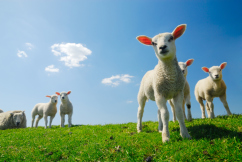
Ashworth attributed low prices to an increase in supply and carcase weights, with UK abattoirs slaughtering 6.5% more sheep than last year. “The challenge for producers is to manage the orderly delivery of this increased supply onto the market within customer specification.
“Earlier this year there has been a higher than normal proportion of lambs exceeding the standard quality quotation upper weight limit of 45.5kg liveweight,” Ashworth added.
He was confident that the increased lamb numbers would supply export markets where lamb supply was tighter – for instance France and Spain. However, this has met with difficulty over exchange rates as sterling remains strong against the euro, which is “more challenging” for Scottish and UK lamb exporters.
“Adding to this export pressure is weak consumer demand in Europe,” said Ashworth.
“France has seen the consumption of lamb decline by almost 7% during July, although the country’s domestic production fell by 3%. Over the longer period of January to July, however, consumption has increased slightly.”
The National Farmers’ Union (NFU) is encouraging producers to take to social media to bring retailers who are promoting out-of-season foreign lamb into light.
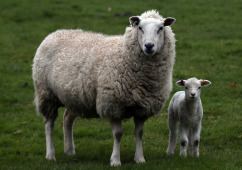
NFU livestock board chairman said British lamb should be given “pride of place” on supermarket shelves and is urging people to Tweet pictures of supermarkets failing to do so to @NFUtweets using the hashtag #BackBritishFarming.
Sercombe said: “I believe I speak for all livestock farmers when I say that I am bitterly disappointed to see that, at a time of year when there is an ample supply of fresh, tender and delicious new-season lamb available, some retailers are failing to live up to their commitments to support British farming.
“This year has seen an excellent growing season for lamb, and you would think that this would be reflected on the shelves. Instead, as the photos we have been receiving from members show, facings are still failing to promote this fantastic meat at the peak time of year. The strength of feeling farmers have on this was shown at the Royal Welsh this summer.”
Some retailers, namely Tesco, have already come under fire on Twitter for not supporting British lamb, instead choosing to promote New Zealand products